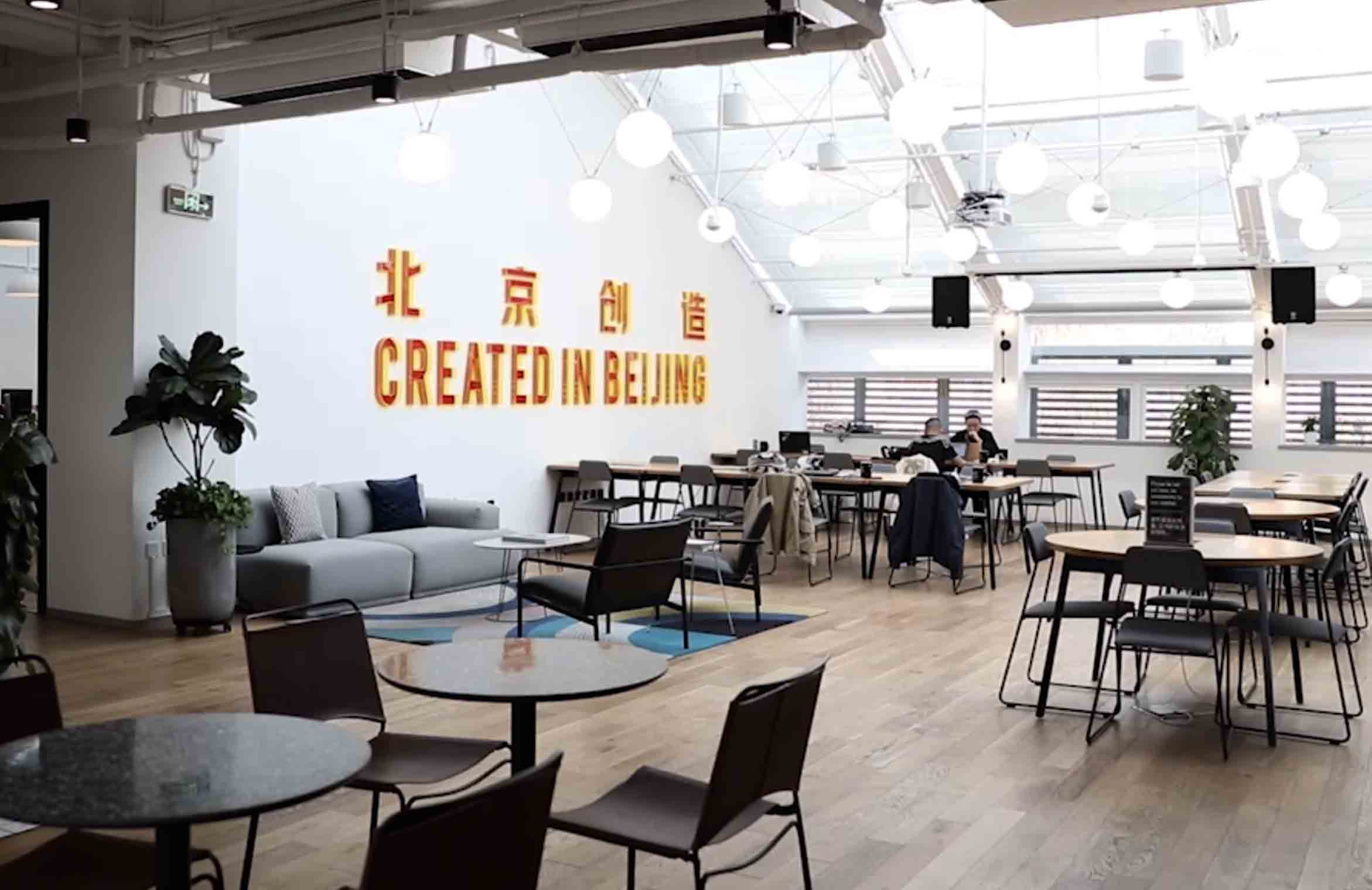


WeWork's Sanlitun Community Space offers people a subscription to an office as an individual or a company on a monthly basis.
I don't own a bike in China, but that doesn't mean I can't cycle to work every morning. Everyone knows the share bike as the pinnacle of China's share industry. By merely downloading an app and entering my details, I can use any number of bikes dotted around the city.
China's share industry is growing fast. Last year, the market turnover of China's sharing economy reached 4.9 trillion yuan, an increase of nearly 50 percent from the previous year. The sharing economy isn't unique to China – companies like Airbnb and Uber have gone from strength to strength on a global level.
The novelty of the sharing economy
However, the difference between here and the West is the sheer reach of Chinese products and spaces which the sharing economy has infiltrating into. The latest craze to hit the headlines earlier this year was the shared makeup booth. Despite seeing them everywhere on social media, I have rarely seen one in real life, so I track one down in Beijing's CBD to find out just how easy they are to use.

Shared makup booth gives you access to the private booth for a quick makeup fix
The booth costs around 10 RMB per 15 minutes, which gives you access to the private booth along with a variety of lipsticks, eye shadows and creams.
Although a cheap makeup fix, it seems that this booth, in particular, hasn't received much maintenance, and the makeup isn't very well looked after, so although I like the concept, I'm not sure I'd be back to this one.
One item of the sharing economy I'll revisit is my favourite – the karaoke booth. Not only is the box completely soundproofed, but it is equipped with microphones, headphones, and a range of effects, which helps even the worse singers among us sound passable!
Despite claims that the sharing economy cannot continue to grow at the same rate, it's predicted that in the five years from 2018, China's share economy market value is expected to expand by more than 30%, and a lot of this comes down to this type of novelty use item.
Shared business opportunities
Of course, the sharing economy isn't just making its money from these items dotted around malls. It's expected that by 2020, the sharing economy's transaction volume will account for over 10 percent of the country's GDP output as new opportunities emerge.
Millions of people are entering the job market each year, and a number of these are entrepreneurs that have an idea but can't yet afford overheads such as a costly office lease. These people are turning to the sharing economy.
WeWork is an American company which specializes in shared office spaces, offering people a subscription to an office as an individual or a company on a monthly basis. It has been hugely successful in China since it entered the market, where domestic shared offices spaces such as KR Space and UCOMMUNE are also doing well.
Wang Wei, GM for AppsFlyer in China, explained, "The first advantage is its flexibility of space. If we employ 20 people, we can rent a relatively small office space. The more people we have, the bigger the area we will take. If we rented an office, we wouldn't have this flexibility."
The second advantage, Wang continues, is its sense of community. "There are all kinds of companies here, or companies of one kind. In this kind of shared office space, we are more closely connected. People have more chemistry."
Shared offices are just one in a number of new shared working environments. One of the latest is the concept of the shared kitchen, which allows users access to a large scale kitchen unit without the overheads of a typical restaurant and staffing costs. The volume of China's online food ordering and delivery market hit 441.5 billion yuan ($65.8 billion) last year, up 112.5 percent from 2017, according to China Daily, and the concept of the shared kitchen allows new restaurateurs access to this growing market.
From sharing business to sharing fashion
Not content with only changing where we work, the sharing economy is even influencing what we wear. Shared wardrobes are one of the latest areas to have seen significant growth. E-Cool is an online shared wardrobe, which, like many other similar companies, allows users to pay a subscription fee to rent clothing and accessories.
E-cool was founded less than two years ago by Li Yanmo; an idea born out of university, after Li noticed a gap in the market where students and new graduates wanted to look the part, but couldn't always afford to.
"When it comes to entry-level luxuries for Chinese girls, the purchasing rates are pretty low," said Li. "The main reason is lack of funds, so we further expanded this concept and founded the shared wardrobe. People can get clothes they like at a lower price and higher quality."
E-Cool recommends clothes that the user may like but also suggests new styles and choices. "Typically, e-commerce platforms recommend items that the consumer already likes, but we try to promote something different. We want this girl to try a different style," Li said, noting that by using his platform, the user can try out new styles for a lower price using a concept he calls "meet a different self."

Shared wardrobe encourages customers to try more different styles
The company has also built a logistical cleaning park in Jinan, Shandong. To combat concerns over hygiene when using a shared wardrobe, each garment comes with its own unique code. Users can scan the code on the clothing label and get real-time information about the item's condition and cleanliness.
"Our warehouse also has a 24-hour live broadcast on the mobile APP to realize real-time monitoring of the factory," said Li, explaining that it's useful for management supervision, but also allows users to check on factory conditions.
When asked what role the shared wardrobe will have in the future of fashion, Li said, "We are all at the beginning of this field. In the future, [I think] it will certainly take up a large proportion of clothing sales."
As the share industry continues to expand in every aspect of life, from workplaces and concepts to make daily life more convenient, to share scooters and e-cars to help cut down on congestion and pollution, I doubt very much that we've yet witnessed the peak of the share industry.

 Award-winning photos show poverty reduction achievements in NE China's Jilin province
Award-winning photos show poverty reduction achievements in NE China's Jilin province People dance to greet advent of New Year in Ameiqituo Town, Guizhou
People dance to greet advent of New Year in Ameiqituo Town, Guizhou Fire brigade in Shanghai holds group wedding
Fire brigade in Shanghai holds group wedding Tourists enjoy ice sculptures in Datan Town, north China
Tourists enjoy ice sculptures in Datan Town, north China Sunset scenery of Dayan Pagoda in Xi'an
Sunset scenery of Dayan Pagoda in Xi'an Tourists have fun at scenic spot in Nanlong Town, NW China
Tourists have fun at scenic spot in Nanlong Town, NW China Harbin attracts tourists by making best use of ice in winter
Harbin attracts tourists by making best use of ice in winter In pics: FIS Alpine Ski Women's World Cup Slalom
In pics: FIS Alpine Ski Women's World Cup Slalom Black-necked cranes rest at reservoir in Lhunzhub County, Lhasa
Black-necked cranes rest at reservoir in Lhunzhub County, Lhasa China's FAST telescope will be available to foreign scientists in April
China's FAST telescope will be available to foreign scientists in April